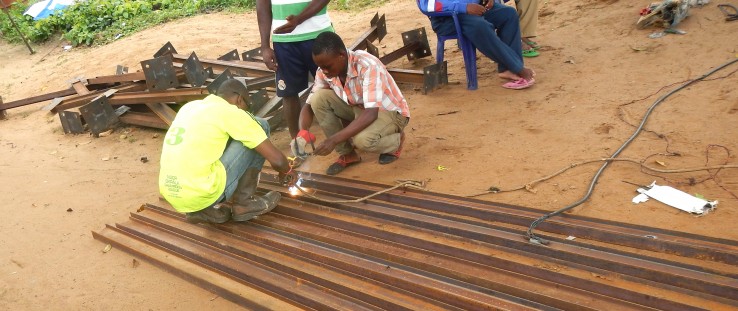 A local welder fabricates the photovoltaic array structure designed by GVE Projects.
GVE Projects Ltd.
A local welder fabricates the photovoltaic array structure designed by GVE Projects.
GVE Projects Ltd.
 A local welder fabricates the photovoltaic array structure designed by GVE Projects.
GVE Projects Ltd.
A local welder fabricates the photovoltaic array structure designed by GVE Projects.
GVE Projects Ltd.
For light at his home when he was a child, Amos Nguru used a homemade lantern. Take a can, puncture it to create a hole, add kerosene and a wick, and voila, a homemade lantern.
“I did not grow up with electricity,” says Nguru, who grew up in Kenya. “We used different forms of lanterns. That comes with a lot of smoke so it does affect the eyes when one is reading.”
Nearly four decades later, a lot has changed for Nguru, who is the CEO of Afrisol Energy Ltd. and powers his suburban home in his native country with solar technology. But the same can’t be said for two-thirds of people who live in rural and underserved areas of Africa and have mostly no access to electricity from any source.
“If you want to reach the majority of Africans, one needs to be thinking about off-grid approaches,” said U.S. African Development Foundation President and CEO Shari Berenbach.
That is the crux of the Power Africa Off-Grid Energy Challenge, a year-old competition to attract proposals that answer Africa’s need for sustainable, simple and cheap energy solutions for the continent’s rural residents. Businesses, universities and entrepreneurs are asked to submit ideas that can be put into use in a short order. The best six from the first round of competition in 2013 received funding—as much as $100,000 a piece—from the U.S. African Development Foundation (USADF) and General Electric. USAID is adding funding for winners of the competition’s second round, which opened in May and announced 22 finalists Sept. 25.
The second round of the competition is open to participants from all six Power Africa countries—Ethiopia, Ghana, Kenya, Liberia, Nigeria and Tanzania. Only Kenyans and Nigerians were eligible for the first round. The decision was, in part, an acknowledgement by backers of the off-grid challenge that they weren’t quite sure what to expect.
“We kind of didn’t know,” Berenbach said. “Often people said to us, ‘Oh, the better projects involve Americans with Harvard MBAs.’ So there was a real question whether we would receive any viable applications.”
They did—150 in the first round and 278 in the second. And, there will be three times as many finalists announced in the second round as there were in the first.
“We were impressed with the quality of the applications in the first and second rounds,” says USADF Regional Program Director Tom Coogan, echoing the notion of “uncharted territory” the foundation found itself in back in September 2013 when round one began.
Funding a Dream
Amos Nguru’s idea for building a biodigester in a Nairobi slum was one of the six proposals to win funding. Biodigesters work by breaking down materials—in this instance waste from school bathrooms—that then produce a byproduct called biogas that can be harnessed and converted to electricity. Nguru’s biodigester will, in part, power the 2,000-student Mukuru Kwa Njenga Primary School.
“Right now they have some connection [to the electrical grid], which is not very stable,” that can be partly blamed on the school’s location, Nguru said.
“We intend to generate 15 kilowatts of electricity every day. Out of that, the school will receive 5 kilowatts, which is sufficient for all of their needs: to be able to power their computers and to light up the classrooms when they need to do evening classes and very early in the morning,” he said. The remaining kilowatts will power security lights in the surrounding community.
The idea for his project actually came out of an experiment the chemistry graduate performed at university using diesel. It was clear even then that the fuel wasn’t going to be a long-term solution. “I did my research,” Nguru, 41, said, “and I was able to tell that biogas is the thing of the future.”
But putting those ideas into action would require funding. And, he says, the off-grid challenge has been one solution.
“I found it quite interesting,” Nguru said, revealing a hint of understatement. “I believed I had good idea, which I would not have been able to finance. It was giving me an opportunity to realize my dream.”
The biodigester could be up and running by September, a few months ahead of schedule. And, he said, the teachers at the school are excited not only for more reliable power, but also that the project also includes repairing bathrooms that often overflowed during rains, causing sanitation headaches.
The quick-turnaround is what sets these smaller projects apart from the huge regional and national power efforts that are the better known part of the Power Africa initiative. “The really exciting thing … is we’re going to see direct results for these grassroots folks almost immediately and in very practical terms. We are seeing that already actually,” says Coogan.
Little Guys, Big Ideas
Berenbach is pretty sure the American model of a power grid covering the entire country is not the answer for African nations and their majority rural populations.
“We think that the solution for energy and bringing power to Africa is really wrapped up in a story of innovation,” she said. “How can we find new ways to bring new energy that is affordable and sustainable and reaches communities that are spread throughout the continent? We need to make sure that energy is reaching the majority of Africans. We believe that the key to doing this is bringing to bear new technologies and approaches. It’s an era of great innovation and that’s what’s going to make it possible to realize the goals that Power Africa has set for itself.”
Like his fellow off-grid challenge winner, GVE Projects Ltd.’s Ifeanyi B. Orajaka also came up with the off-grid project in college, spurred on by the “absolute electrical poverty” he found while doing field work as an intern for a multinational oil and gas company. The 26-year-old city dweller grew up never having to experience living without electricity. And he says what he saw in rural Nigeria reversed his planned career climbing the corporate ladder “towards a mindset of adopting appropriate/innovative technologies and entrepreneurship for the benefit of humanity.”
That led to GVE’s project to provide two 9-kilowatt off-grid solar electricity systems, each with two sets of portable battery kits, or PBKs. “Each system will supply electricity to an estimated 80 homes and several businesses in Egbeke, a remote off-grid settlement in the Etche LGA [local government area], Rivers State, Nigeria,” Orajaka explained. “With an average household size of 15, the estimated direct impact of the project is about 2,400, while an additional 300 people will be impacted indirectly through the cottage businesses and street lighting components also attached to the project.”
The solar-powered, battery backed-up system will replace kerosene and hurricane lamps, candles and gasoline as the prevailing sources of energy for these homes and business, reducing both noise and air pollution. Orajaka also expects residents will lower their energy costs.
“While large multinationals have all the technologies and funding to implement large-scale power projects, they may lack the simple, immediate connection between technology adaptation and local expertise to solving energy poverty on a micro level while unlocking local potentials within African communities, because an average African is highly innovative,” he added. “This is a tripod of socio-cultural, technological and entrepreneurial innovation. Africa’s energy challenge is quite complex and will require the efforts of indigenous Africans to a great extent towards its resolution as our societies are differently modeled from what is obtainable in Europe and America.”
Generating Success Beyond Renewable Energy
Afe Babalola University, or ABUAD, in Ado-Ekiti, Ekiti State, Nigeria, is another first-round winner with its project to generate 2.5 megawatts of electricity through a hydro-electric power system.
University founder and namesake Aare Afe Babalola said, “I had long conceived an idea of finding low-carbon energy solutions that would not rely upon the municipal infrastructure. I believe that current approaches to energy in Nigeria are unsustainable and non-renewable. My university is, of course, situated near a stream that flows all day long and year-round, making harnessing water power worthwhile through hydro-electric generation.”
If all goes as planned, the water-powered system would provide enough electricity to serve 10,000—covering the entire university and stretching into neighboring communities. It would replace power the school now receives from the national grid. The university expects its energy bills to drop, but also anticipates the hydro system will spur economic growth in the surrounding areas.
University officials are moving already to address concerns such as seasonal changes that impact water flow and how diverting water for energy will impact neighboring communities. Other projects also have grappled with challenges, including the usual regulatory issues and red tape that come with mounting a municipal project. Coogan, with USADF, added that so far the six winners of round one of the competition have had only the typical setbacks that pop up with any infrastructure projects.
The winning projects run the gamut, he said, from small to sophisticated. There’s always a risk “when working with a small organization and they don’t have a lot of experience in this. Part of what we’re doing is helping them build that experience,” Coogan said.
The goal, he adds, is to show that these business models can succeed, be profitable and be replicated in other rural places facing similar energy deficits.
So far, all signs are encouraging. “They’re able to actually implement some of these solutions that exist in the world, but have never been used in Africa,” Coogan said.
Adds Kenya’s Nguru, speaking for all the off-grid challenge participants: “Sometimes we have very good ideas, but we are not able to finance them. These companies can now grow. These projects which we do have a very high return on investment.”
Winners
Solar World
Afrisol Energy Ltd
Mibawa Suppliers
TransAfrica Gas and Electric
GVE Projects
Afe Babalola University
Judges
U.S. African Development Foundation
GE World Bank
Shell Foundation
Millennium Challenge Corporation
Read more about each of the projects.
RELATED LINKS
Video: Bio gas energy project in Mukuru slum set to turn the slum life around







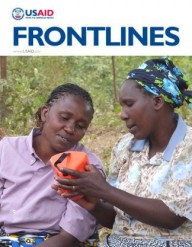

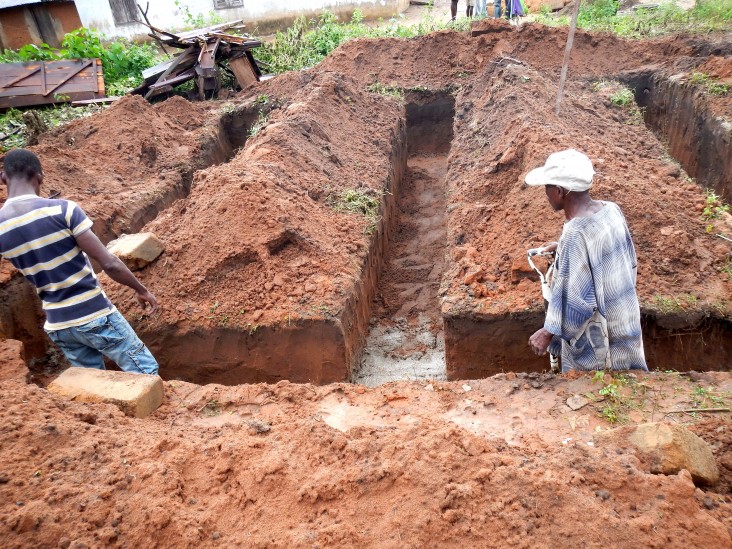
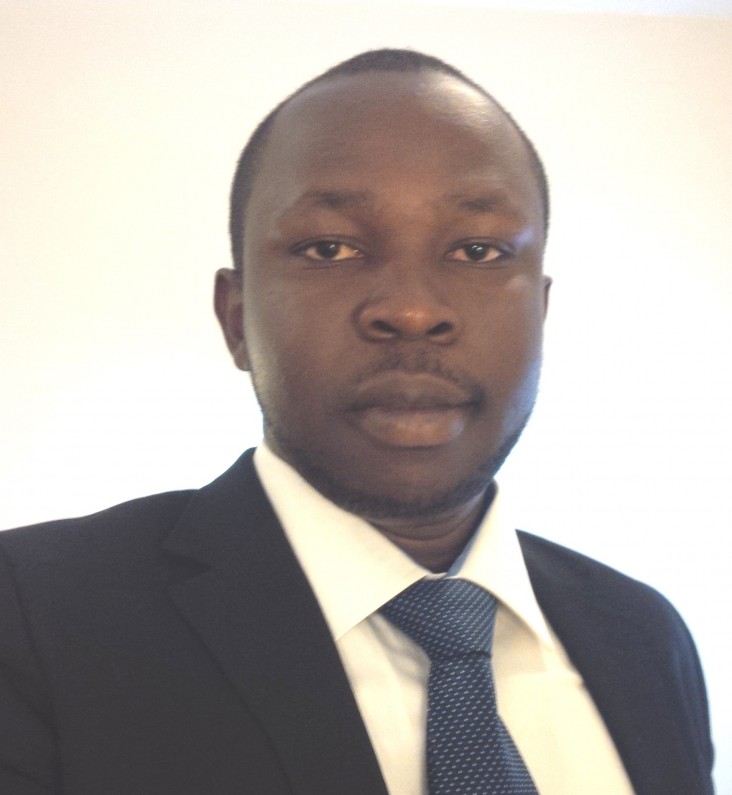
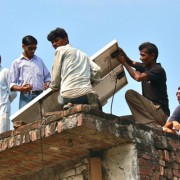
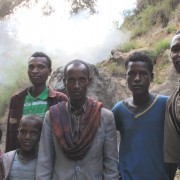
Comment
Make a general inquiry or suggest an improvement.